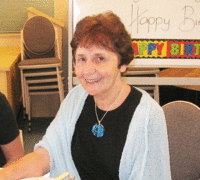Reflect
Veronica Lawson rsm
27 January 2012
 One of my regular global intelligence sources, STRATFOR (www.stratfor.com) featured in
One of my regular global intelligence sources, STRATFOR (www.stratfor.com) featured in
its January 11 edition an annual forecast for 2012. STRATFOR says 2012 is unique as a year in which the forecasts point to ‘a redefinition of the way the world works’. It seems to me that Mark evaluated the life, ministry, death and resurrection of Jesus of Nazareth and the kin-dom of God movement that emerged in first-century Palestine along similar lines. This Jesus event was not just one event among a succession: it was pointing to a new definition of the way the world worked or, at least, of the way God was working in the world.
Today’s gospel passage continues Mark’s account of a typical day in Jesus’ ministry. The setting is Capernaum. Jesus has just left the synagogue where he has freed a man who had been caught in the power of ‘an unclean spirit.’ He moves, in the company of two of his new disciples, from the synagogue to the house of Simon and Andrew. In other words, he shifts from a long established gathering place for God’s people, the synagogue, to a prospective new locus of communal engagement, the house church. This new locus does not preclude the older locus: Jesus continues to teach and heal in the synagogues throughout Galilee.
In this new place of encounter with God, Jesus heals a woman who is identified only in relation to her son-in-law, Simon. Jesus takes her by the hand and raises her up. She may not be named, but she is the first human character in the Markan gospel story who is said to ‘minister’. In other words, the love of God working through Jesus draws her beyond herself to engage in a ministry of caring for God’s people. A little earlier in Mark’s gospel we heard that angels ministered to Jesus in the desert: in other words God looked after Jesus as he embarked on his mission of bringing God’s love into a broken world. Now this woman is caught up in the same mission. Mark is beginning to provide a new definition of the way the world works.
That same evening, Simon’s house becomes a magnet for ‘the whole city’. Jesus heals their sick and afflicted and, early in the morning, he seeks the solitude of a ‘desert’ place for prayer. The disciples seek him out, because everyone is looking for him. Jesus makes it clear to them that he must move on and bring God’s word and healing beyond the city to the neighbouring Galilean towns. The message is for us as well as for those early disciples. Amid all the demands of a sometimes frenetic programme, we too must search out the solitude of a ‘desert’ place for prayer and engage with renewed energy and insight in whatever the new day brings.